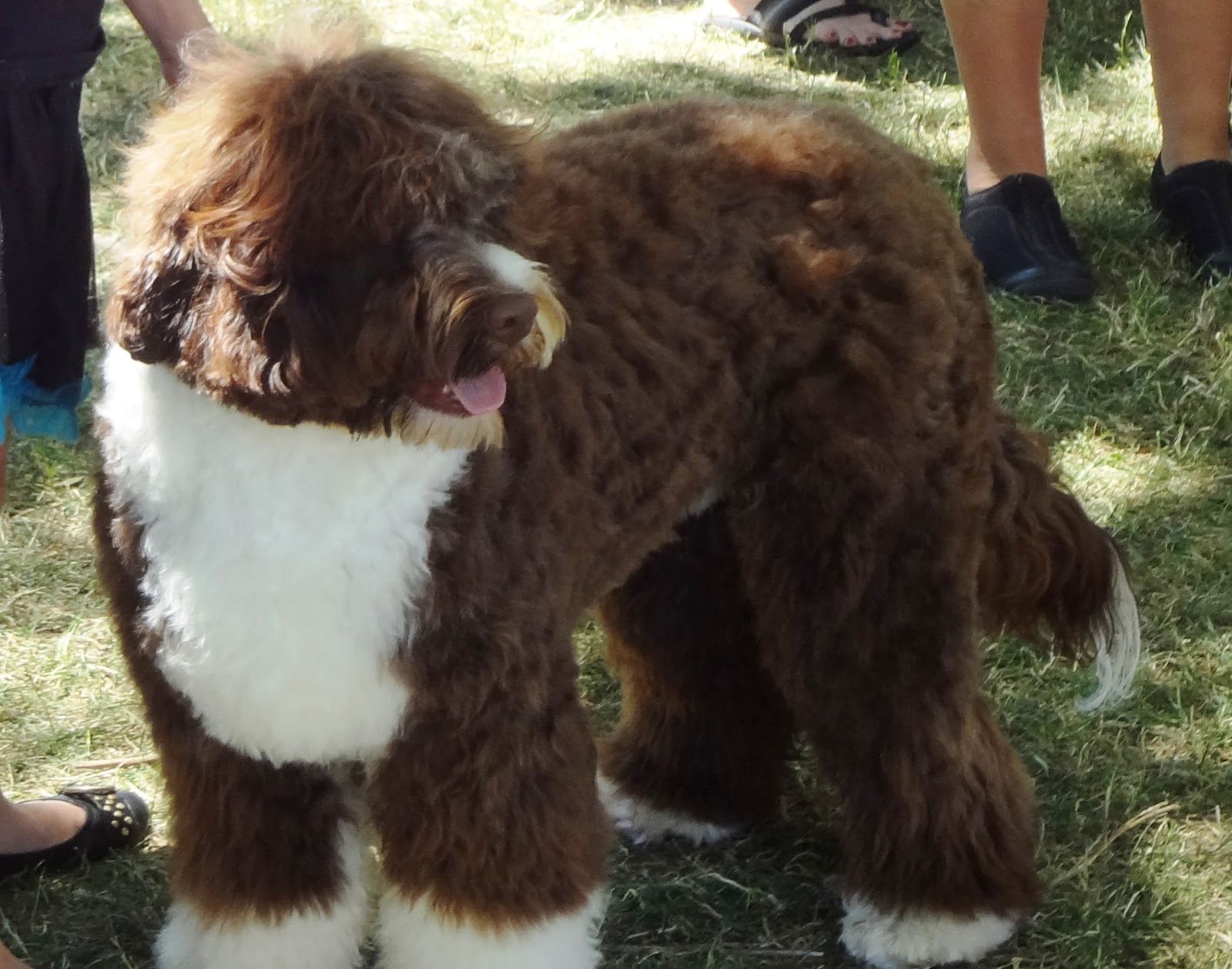Pet allergies are a big problem in the US, with many sufferers assuming they need to miss out on that special bond with a canine companion, however, that doesn’t necessarily need to be the case. There are certain allergy-friendly breeds of dog that can live quite happily with sufferers without causing a nasty rash or sneezing fit and the lovely Portuguese Water dog also known as the “Portie” or PWD is one such breed.
These loyal energetic working dogs make fantastic companions for active families and an added bonus for allergy sufferers is; they won’t have you, breaking out in hives or constantly reaching for a box of tissues. Do Portuguese Water dogs shed? Yes, of course, all dogs shed to some degree, but they have a single coat so only shed minimally, producing fewer allergens which are easier to control.
Is It True, Are Portuguese Water Dogs Hypoallergenic?
Yes, they are. However, people who suffer from severe allergies can still be allergic to hypoallergenic breeds, as the proteins which trigger symptoms can be found in saliva and urine as well as dander. It is always recommended to spend time with your chosen dog before committing to bringing them into your family and it is important to remember that while puppies may not cause a reaction an adult Portuguese Water dog might.
What does hypoallergenic actually mean?
The word hypoallergenic came about during the 1950s, referring to skin care products and cosmetics. People to this day still assume that it means non-allergenic, which is definitely, not the case. The correct definition of the word is; that there is a reduced or lesser risk of an allergic reaction, something that needs to be taken into account before rushing out to buy the first Portuguese Water Dog for sale that you see.
3 Reasons Why the Portuguese Water Dog is a Choice Breed Among Allergy Sufferers
- The Portuguese Water Dog’s coat gives them their low allergy status, most single coated dogs are touted as hypoallergenic as they do not shed an undercoat and only lose the odd hair here and there.
- Curly coated Portuguese Water Dogs are better suited to allergy sufferers as the curls, trap any allergens they may have collected and stop them being released into the air.
- This breed of dog does not drool or bark excessively and as one of the main causes of allergic reactions is a dog’s saliva this is a good thing.
The Portuguese Water Dog and allergies – What should I do?
If you or a family member has a pet allergy, the worst thing you can possibly do is rush out and buy a cute Portuguese Water Dog puppy, because they are classed as hypoallergenic. Unfortunately, even with dogs that are classed as allergy friendly, reactions can occur so it is important to do your research, spend time with the breed and if possible your chosen pooch before bringing them into your home.
With almost 4 million dogs entering rescues and shelters every year and allergies being a common reason, it is important to discuss with your allergist the possibility of being able to control symptoms, if they did occur at a later stage. Other things which may help you determine if you and a Portuguese Water Dog could share a home include;
- Getting in touch with the Portuguese Water Dog Club of America This is a fantastic starting point, as they can provide lots of information about the breed, local shows, and events as well as breeders.
- You could also become a volunteer at a breed specific rescue. Many are looking for temporary foster homes for the dogs they take in, which would give you the perfect opportunity to spend time together a “try before you buy” so to speak.
5 Ways to Reduce the Risk of an Allergic Reaction from Your Pooch
- Use a steam cleaner for your floors, skirting boards, and surfaces, allergens are sticky things and can hang around for weeks, a steam cleaner will destroy those pesky particles.
- Keep your bedroom pet-free, you spend almost a third of your time in there, so it is essential your boudoir is not full of allergens, which love to hide in bedding and soft furnishings, also some allergy sufferers declare their symptoms can be worse at night so keep Fido out.
- Wash dog blankets, bedding, and soft toys on a weekly basis using a hot cycle of at least 60 degrees.
- Nowadays there are products such as Allerpet® which can reduce the dander on your dog to tolerable levels and is both safe and effective.
- Invest in an air purifier containing a HEPA filter, these work by pushing the air through a very fine mesh that removes minute particles such as pollen, dust and pet dander.
All about the Portuguese Water Dog – Origin of the Breed
The Portuguese Water Dog is one of the ancient breeds thought to have originated on the steppes of Asia around 700 BC. How they arrived in Portugal is a mystery, some think they came across with the Moors in the 8th century, others believe they were introduced by the Goths, which may have some validity as Ostrogoths’ dogs eventually became the German “Pudel Hund” or water dog both the Poodle and Portuguese Water Dog have many similar characteristics.
They were originally used for herding fish into nets as the boats came ashore, retrieving broken nets, helping fishermen who fell overboard and carrying messages between fishermen and back to shore. When the fishing industry declined in the 1900’s the breed almost suffered the same fate, at one point only 25 remained in the world.
Efforts to save the breed from extinction began in the 1930s and in 1958, two Portuguese Water Dogs arrived in the United States and their popularity grew steadily. On the 1st January 1984, the Portuguese Water Dog was accepted by the American Kennel Club as a member of the working group.
Barack Obama owned 2 of these wonderful canines during his time at the White House, named Sunny and Bo they became the most famous dogs in the world and this has seen another rise in the breed’s popularity.

Source: michellepictures.com
General Appearance
The Portuguese Water Dog is hardy, dog, rectangular in outline and well-muscled. A male dog stands between 20-23 inches while female Portuguese Water Dogs are slightly smaller at 17-21 inches, they can weigh anything from 35-60 lbs.
The head is well proportioned; with a long muzzle; the neck short and strong leads to a level back and the tail is powerful, useful as a rudder, when they are swimming. Like all water dogs, the PWD has webbed feet for ease of movement in the water.
The coat is profuse and can be wavy or curly; it comes in a variety of colors, brown, black, white, or any of these with white markings. It can be clipped in one of 2 ways either the lion cut often seen on Poodles or the Retriever clip where the hair is left around 1″ in length all over the body.
Temperament
The Portuguese Water Dog temperament is perfect for an active family, he is above all a working dog and needs vigorous exercise, so couch potatoes should choose an alternative breed. Mental stimulation is also essential the Portuguese Water Dog is highly intelligent and can become destructive if bored or left for long periods.
They are exuberant, playful and have a sense of humor often performing tricks or being silly to provoke a reaction. They get along well with children, though can be boisterous when young and knock small children over. Of course, they adore water and if you are lucky enough to have a swimming pool you will need to share. These dogs make a great jogging or cycling companion as they can run all day and surprisingly can live happily in apartments as long as they get sufficient exercise.
Portuguese Water dogs are renowned counter surfers, and love a good chew, so hide your favorite shoes, but, for the right owners, they make a wonderful family pet.
Source: YouTube
Health
The Portuguese Water Dog’s lifespan is 10-14 years, they are relatively healthy and suffer from just a few issues such as;
- GM1 Storage Disease – This is a recessive genetic disorder and is fatal to affected puppies the PWDCA is working together with breeders to try and eliminate this condition with DNA testing.
- Hip Dysplasia – This condition affects many medium or large breeds and the breeder should provide the hip score of the parents.
- Progressive Retinal Atrophy – This is another condition for which the breeder should have documentation from the OFA to prove the parents are clear.
- Addison’s Disease – Portuguese Water Dogs have a higher propensity for this genetic condition than some breeds, it occurs when the adrenal glands deteriorate but can be managed once diagnosed.
- Follicular Dysplasia – A genetic form of hair loss most often seen when a curly sire is mated to a curly dam, it is normally restricted to the torso and causes no irritation
Portuguese Water Dogs, like a lot of other breeds, can suffer from just as many allergies as you or me. Contact allergies, food allergies, and inhalant allergies are all relatively common and they present themselves in a similar way to humans, itchiness, eye irritations, digestive problems, coughing, sneezing.
“Treatments” include establishing the cause and avoiding it. Allergens can be found in food ingredients, shampoos, dust, pollens, molds and of course fleas. Using hypoallergenic products, shampoo, foods etc, can help reduce symptoms or you may have to resort to antihistamines, herbal remedies or prescribed medications.
Food
The Portuguese Water Dog should be fed a food suitable for working dogs which is high in protein. This breed can be prone to food allergies so, it may be worth considering feeding a hypoallergenic food which does not contain fillers, artificial coloring, and preservatives. You may find it helpful to introduce supplements to a PWD diet. Probiotics are good as they promote healthy bacteria in within the gut and some others include:
- Omega 3
- Fatty Acids
- Vitamins B and E
- Quercetin
- Kefir
Keeping your canine companion healthy and happy is the most important thing you can do for them to ensure a long active life and this begins with a healthy balanced diet.

Source: Pinterest.com
Finding A Good Portuguese Water Dog Breeder
If you decide the Portuguese Water Dog is the right breed for you, the first thing you need to do is find a good breeder, do not be tempted by Portuguese Water Dog puppies for sale at a knock down price, as these will almost definitely be from puppy mills or backyard breeders where focus on the health and temperament of the breed is not a priority.
A good Portuguese Water Dog breeder will be happy to answer queries you have about the suitability of the breed to your lifestyle and be knowledgeable about diet and health issues.
Before you type into Google “Portuguese Water Dog puppies for sale near me” it is advisable to have a look at the PWDCA website where you will find lots of information about the breed, regional clubs, and resources, as well as a list of breeders, you may have to travel to find the perfect puppy.
You could also join online forums dedicated to the breed where you can talk to other owners, ask questions and maybe get some recommendations for breeders or news of upcoming litters.
3 Red Flags to Look Out for When Searching a Bolognese Breeder
- Do not be taken in by con-artists who send you pictures of cute “Portie” puppies, will ship for free and take payment credit card payments online. You will more than likely be waving goodbye to your money. Always visit the puppy!
- Don’t buy from breeders who cannot provide references. Good breeders that have a Portuguese Water Dog for sale should have previous satisfied buyers willing to endorse them.
- The Portuguese Water Dog is a working dog and it will be unlikely that the breeder isn’t involved in some sort of activity with their dog, be it showing, agility, water work or obedience, this shows an active interest in the breed rather than your credit card.
Adopting a Portuguese Water Dog from a Rescue or Shelter
The Portuguese Water Dog is not for everyone, so there are occasionally ones to be found in local shelters although these are often mixes, and while a PWD crossed with a poodle may be OK for allergy sufferers, one crossed with a Border Collie for example may not, so it is more important than ever, if you go down this route, to spend time with your chosen dog. Check out sites like Petfinder and Adopt a Pet to see if there are any nearby.
The best option when considering Portuguese Water Dog Adoption is to contact a breed specific Portuguese Water Dog rescue such as the one run by the PWDCA, they accept dogs which end up in shelters plus ones direct from owners looking to rehome their dogs, they also neuter/spay, micro chip, sort out any grooming issues and get the dog vet-checked before rehoming.
If you decide you want to adopt a Portuguese Water Dog you will need to be prepared to wait a while, although they are a popular breed ranked #51 on the AKC list, they do not come up for adoption often.
How Much Will a Portuguese Water Dog Set You Back?
The bad news is, these dogs don’t come cheap, you can expect to pay between $1200-$3000 for a purebred Portuguese Water Dog puppy depending on the sex, where you live, and whether the puppy is show quality.
You also need to take into account the cost of insurance, regular professional grooming, vet bills, food, bedding treats etc, on top of the original price. This is a lot of money, which is why is it essential for allergy sufferers that you know for certain you will be able to tolerate the dog, spend as much time as possible with the breed and discuss with your allergist the options if you do suffer a reaction later down the line.
Many breeders will provide a contract of sale, whereby, the breeder is given first refusal if the worst happens and puppy needs to be rehomed.

It’s a Wrap
So, there you have it, these lovely, intelligent, playful dogs are a fantastic choice for an active family, they can run all day and love to swim, so do not choose this breed if you spend all day lounging around, they easily become bored and can be destructive without physical and mental stimulation.
While their single curly coat may not bring you out in a rash, it does need an awful lot of attention, daily brushing to prevent tangles and regular professional grooming every six to eight weeks.
They are great with kids although can be a bit boisterous and they do tend to jump up, with early socialization they can also live happily with other animals. They are a family dog and do not like to be left alone for long periods, as this can result in separation anxiety.
We’ve hopefully answered the question “Are Portuguese Water Dogs hypoallergenic?” and a few others along the way. They are an expensive breed, relatively easy to train, have a sense of humor and best of all the allergy-friendly Portuguese Water Dog makes a great non-molting dog, suitable for active families who love the outdoors, which is not to be sneezed at.









